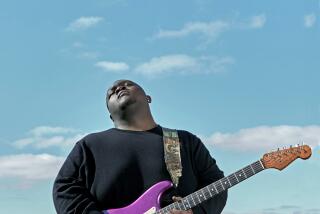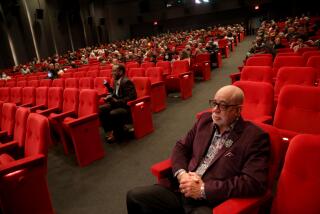The Power of Trower : The ‘70s Guitar God Amplifies the Blues Elements of His Sound
- Share via
Power rock of the ‘70s. Roaring, other-worldly, blues-steeped electric guitars, thundering through stacks of Marshall amplifiers, blissfully bleeding the ears and benumbing the brain.
Robin Trower, who performs tonight and Thursday night at the Coach House in San Juan Capistrano, was one of the genre’s most acclaimed practitioners during the era of six raging strings.
As a member of Procol Harum from 1967-72, Trower’s hard-edged predilections sometimes seemed to contradict the rest of the band’s Gothic, classical-leaning vision.
On subsequent albums including “Home” and “Broken Barricades” the artistic tension grew ever more obvious, as Trower’s screaming, distorted lines often sounded oddly out of place in the context of Procol Harum’s increasingly arty, refined material.
Although he appeared on the Procol Harum reunion album of 1991, “Prodigal Stranger,” he sidestepped the tour (the group had disbanded in 1977) that went with it.
“I think they always knew it was kind of ‘maybe’ as far as I went,” said Trower in a recent phone interview. “I couldn’t find the space I needed to play what I felt, and we were never really on a social level together.”
After leaving Procol Harum, Trower formed a fleeting group called Jude with ex-members of Jethro Tull and Stone the Crows. The project lasted less than a year.
Retaining bassist/vocalist Jim Dewar from Jude and recruiting drummer Reg Isadore, Trower formed a Jimi Hendrix-inspired power trio that would record his most familiar music. The group’s second album, 1974’s “Bridge of Sighs,” became a guitar-lover’s classic.
Commercial and artistic success aside, Trower was not without his share of critics, many of whom opined that his sound and approach bordered uneasily on plagiarism of Hendrix.
“I’ve always been the first to admit that (Hendrix) is a big inspiration,” he said. “I just flat-out say that without people like him, my music wouldn’t exist. I don’t know what my music would be like without that fountainhead of inspiration.”
*
Trower recorded a number of albums in the ‘80s, working with ex-Cream bassist Jack Bruce (“one of my heroes”) along the way. By the end of that decade, he was experimenting with jazz-rock fusion, perhaps to avoid the tiresome comparisons to Hendrix.
Changing times brought changing tastes, and many of the guitar gods of the ‘70s were viewed as anachronisms by younger listeners. Trower’s last album release was 1990’s “In the Line of Fire.”
In another seemingly incongruous pairing, Trower spent much of last year in the studio with singer Bryan Ferry, co-producing his old friend’s latest release, “Taxi.”
Trower has been on the road for several months with a new band featuring Clive Mngaza on drums and Livingstone Brown on bass and vocals. He plans to take the group into a studio in the coming months and expects to release an album early next year--even if he has to finance the release himself.
“I think this music is probably a lot like my early stuff,” he said. “The term ‘power blues’ is a good sort of overview, but now, the groove is much deeper. “Groove-wise and material-wise, it’s more like black music.”
Trower believes that the “dinosaur” tag many artists of his generation were branded with during the punk era has been superseded by a new-found appreciation of their skills. He sees such groups as Pearl Jam and the Red Hot Chili Peppers as simply utilizing new approaches to the old power-trio formula.
“It’s more a matter of comparing them to me rather than the reverse, isn’t it?” he said. “I can see where they’re coming from, but it’s more power than it is anything else--there’s no blues in there.”
“But I think these young guys are starting to come out now and say, ‘These are the people that influenced me.’ They’re being a bit more honest about it now, where before, they would never admit it. I suppose that rose out of the new wave/punk thing, where everything that came before them was rubbish.
“But then,” he added, “they were probably into Led Zeppelin, and I wouldn’t admit it if I had been into Led Zeppelin, either.”
More to Read
The biggest entertainment stories
Get our big stories about Hollywood, film, television, music, arts, culture and more right in your inbox as soon as they publish.
You may occasionally receive promotional content from the Los Angeles Times.










